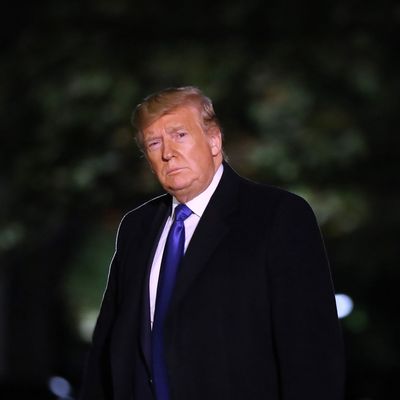
Louisiana senator John Kennedy offered one of the Republican Party’s emerging defenses of President Trump’s extortion scheme. “Here are the two possible scenarios,” he said on Face the Nation yesterday. “Number one, the president asked for an investigation of a political rival. Number two, the president asked for an investigation of possible corruption by someone who happens to be a political rival. The latter would be in the national interest. The former would be in the president’s parochial interests and would be over the line. I think this case is going to come down to the president’s intent, his motive. “
The focus on Trump’s intent is a seemingly clever maneuver. It removes the issue from the realm of statements and actions, which build an incontrovertible case against him, and into the subjective realm of feelings. Maybe, just maybe, Trump really cared about corruption in Ukraine? Investigators can’t climb inside his brain, right? And if they can’t prove anything about how he felt, then how can they impeach him? Feelings don’t care about your facts, you might say.
Yet, while we can’t read Trump’s mind, we do have fairly extensive evidence of his interest in corruption. And every possible objective indication tells us “corruption” was a pure pretext. Trump’s interest in rooting out corruption in Ukraine was not even zero. It was, in fact, less than zero.
Corruption is certainly an important social problem in Ukraine, and the struggle to tame it has been well-documented. The American politician with the most impressive record of anti-corruption activism in that country is Joe Biden. The New York Times, the Washington Post and L.A. Times have all conducted deep dives into Biden’s record, and portrayed him as a forceful and effective advocate for reform. He successfully pushed Ukraine to remove an ineffective prosecutor, Viktor Shokin, who had allowed the country’s oligarchs to operate outside the law. And he helped advocate reforms of Ukraine’s natural-gas sector, saying, “The energy sector needs to be competitive, ruled by market principles — not sweetheart deals.”
It is true that one energy company, Burisma, hired Biden’s son, Hunter, in an obvious bid to gain sway with Biden. But there is no evidence this hiring had any impact on Biden’s actions, all of which were consistent with the cause of reform. Shokin later promoted a theory that he had been planning to investigate Burisma when Biden pushed him out. That theory has been debunked. Hunter Biden was certainly wrong to trade on his father’s name, and Joe Biden was probably wrong to passively allow him to do so. But none of Biden’s actions in office in any way reflect a corrupt influence.
The Ukraine policy architecture that Trump inherited was already geared toward fighting corruption in Ukraine. A thorough review of the transcripts of the impeachment hearings by Slate’s Will Saletan found that Trump simply ignored all the official efforts to oppose corruption there. The National Defense Authorization Act has a process to ensure countries receiving military aid are fighting corruption. William Taylor, the U.S. ambassador, testified that Ukraine had indeed satisfied the assessment. Gordon Sondland testified that when he and other officials told Trump about President Zelensky’s anti-corruption efforts, “He didn’t want to hear about it.”
Saletan’s analysis supplies the answer to the question Kennedy pretends to wonder about. Did Trump actually care about corruption? No, of course not.
But to call Trump uninterested in corruption in Ukraine is to flatter him. Trump’s policy was in fact to roll back the country’s reforms and recorrupt its judicial system and, especially, its energy sector.
To that end, Trump dispatched Rudy Giuliani, who in turn was hired by Lev Parnas and Igor Fruman, two figures linked to the Russian underworld. If you’re looking to fight corruption, you obviously don’t ignore official diplomatic channels and hand over diplomacy to Russian mobsters.
Parnas and Fruman met with Ukrainian officials and demanded an investigation into the Bidens. (Parnas says they threatened Ukraine that Mike Pence would stay away from Zelensky’s inauguration unless the investigation was announced. Pence in fact changed his plans and stayed home.) Parnas and Fruman also pressed Ukraine to give them a piece of the energy import business.
The Associated Press reports that Energy Secretary Rick Perry, who suddenly resigned shortly after Trump’s extortion scheme came to light, also pressed Ukraine to give two of his political supporters a lucrative energy deal. According to documents obtained by the AP, the bid submitted by Perry’s supporters paid Ukraine millions of dollars less than other bids. It was, in other words, the exact kind of sweetheart deal Biden was trying to Ukrainians to stop handing out.
Trump, for his part, barely even tries to indulge the defense his Republicans allies are mounting on his behalf. Rather than feign a sincere interest in “corruption,” at least for a few months until impeachment blows over, he continues to label every politician who opposes him, every media organization that reports on him, and every government body that investigates him “corrupt.” For Trump, the label “corrupt” is nothing more or less than a synonym for anti-Trump. Republicans can’t even seem to get Trump to define the word “corruption” as something other than a synonym for his enemies.
There is zero evidence of Trump advancing the anti-corruption cause in any instance other than the smearing of his domestic rivals. There is wide evidence of him undermining anti-corruption efforts. Trump’s intentions in pressuring Ukraine to investigate his enemies could not possibly be more transparent.






























